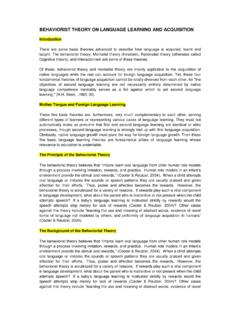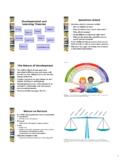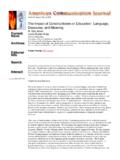Transcription of Motivational Factors in the ESL Classroom - ESL MiniConf
1 Motivational Factors in the ESL Classroom Kevin Baublitz Associate Professor Hankuk University of Foreign Studies, English Department 89 Wangsan-ri, Mohyeon-myeon, Cheoin-gu, Yongin-si, Gyeonggi-do Tel: 31-330-4131. Email: *The article was supported by Hankuk University of Foreign Studies Research Fund 2010. 1. I. Introduction It has always been a major goal in education to encourage motivation and try to make learning interesting for students. The term motivation is derived from the Latin movere , meaning to move , and is commonly defined as a cluster of Factors that energizes behavior and gives it direction. Given the extraordinarily multi- dimensional nature of motivation, it is difficult to study, but perhaps it can best be analyzed by focusing on what causes people to perform a task.
2 Words like choice , persistence and effort can be associated with motivation and it is connected to why people decide to do something or for how long and hard they will pursue a task. The Factors that influence motivation and achievement within the context of a ESL learning environment is what this study analyzed, without any particular hypothesis or Motivational theory in mind. The focus was on what a group of Korean university ESL students had to say about what does or does not positively affect their motivation to study English. The broader perspective of this study was to analyze student responses to a Motivational survey and to suggest ways teachers can better foster a Classroom environment that encourages the development of intrinsic motivation in an English as a second language Classroom .
3 II. Motivational Types There are basically two Motivational types that Motivational theorists describe when trying to explain how students learn and what can provide the best Classroom environment. One Motivational type can be described as external or extrinsic motivation. The roots of extrinsic Motivational theory come from the behaviorist Skinner's research on behavior modification and the systematic use of rewards. The other Motivational type is intrinsic motivation, which is characterized by autonomous or self-directed learning, where the student is in control of their own learning. III. Extrinsic Motivation Those who believe that motivation to learn is prompted by external rewards believe that people are basically passive. Behaviorist philosopher Barry Schwartz notes that students will usually respond only when the 2.
4 Environment tempts them with the opportunity to get rewards or avoid punishments. When a learner receives an incentive or tangible reward to participate or to complete an activity, this is referred to as extrinsic motivation. When someone is extrinsically motivated, the individual spends time to complete an activity as a means to an end or to receive a reward of some type. However, Bowman has conducted research which appears to show decreased motivation among college students who were offered only extrinsic rewards. Bowman claims that rewards are too controlling, do not lead to learner autonomy and serve to undermine self-determination. He argues that extrinsically motivated students eventually become de-motivated which is a state characterized by the belief on the part of the student that their efforts are inconsequential to accomplish a specific task and that they lack the ability to do so.
5 In the field of second language learning and motivation, Park and Kim claim that Korean students are more motivated by social tradition, an extrinsic or an external source of motivation in learning English. Park and Kim suggest that while memorization of grammar and English vocabulary among Korean ESL students is above average, the students' long term ability to stay motivated to master English over a life-time will be inhibited if they are only motivated by social tradition. Cluck points out that language learning will be inhibited if it relies solely on external controls such as parental approval. This seems to confirm what other studies have shown regarding the use of extrinsic rewards as the main Motivational strategy in learning a language.
6 Cluck suggests that since students need to be self-motivated in learning English as a second language, the teacher who de- emphasizes extrinsic rewards such as grades and verbal praise may foster a better language learning environment. IV. Intrinsic Motivation Intrinsic motivation is characterized as more of a self-determined event where learners take responsibility for their own learning and have more of a sense of control. Enhanced motivation is reliant on innate (intrinsic). Factors that cause people to challenge themselves, just as young children do when exploring or encountering a new object for the first time. In the second language acquisition field, intrinsic motivation can be stimulated 3. when teachers become more a manager or facilitator of language learning and relinquish their traditional center- stage authoritarian position.
7 According to Dickinson, intrinsically motivated students become more inclined to set their own goals and monitor their own progress which benefits not only themselves, but the other language learners in the class with whom they interact in small group and paired work. Intrinsically motivated students therefore tend to be more creative and resourceful in using a second language because they are less reliant on the teacher and rather personalize their own learning because the learning involves their natural interest. V. Questionnaire and Participants From a subject pool of 140 age eighteen to twenty four year old students of the English department from two major four year private Korean university campuses, survey questionnaires were distributed to students in ESL.
8 Classes over a period of two weeks. Twenty three of the questionnaires could not be used for this study due to written responses which were not answered with enough specificity or were left blank. It should be noted that since the study was not cross sectional it would be unrealistic to suggest the results of the questionnaire were conclusive. The survey questionnaire included these two questions: (1) In your experience, please explain what single reason or event there is for you to have been motivated to learn English. What encouraged you to stay positive about learning English? Please give the details. (2) In your experience please explain what single reason or event has discouraged you from being motivated to learn English? Please give the details of something that did not help you learn English.
9 4. Table 1. Positive Motivational Factors (a) An English teacher I liked or an interesting class. (b) Communication with native English speakers. (c) Better understand English movies, music, and TV shows. (d) The belief that English ability is necessary to get a job. (e) Encouraged by parents and friends to learn English. (f) English is the global or international language. VI. Discussion of Questions in Table 1. (a) An English teacher I liked or interesting English class. It seems clear that teachers can influence student motivation and achievement, but the frequent question often asked by teachers is why do some students put forth more effort and persist on academic tasks for one teacher, but not for another? Thayer-Bacon asserts that students who see professors who care and develop interactive relationships with students based on trust and respect take more responsibility for their own learning and demonstrate higher levels of intrinsically motivated behavior.
10 Dweck suggests that teachers should create 5. learning environments in which students feel safe to take risks, with an emphasis on helping students to develop learning goals as opposed to performance goals ( grades on tests). Once this kind of learning climate has been established, a caring teacher is then in a better position to maintain student interest in language learning and help the students remain engaged in learning. Students can then receive assistance from the teacher when the learning task becomes difficult, but still retain the sense that they are in control of their own learning. A. student who was influenced positively by a teacher to stay motivated to learn English in this study included this comment on the survey: When I was 12, I met an English teacher in an English institute who was very kind and taught English to our class enthusiastically.







